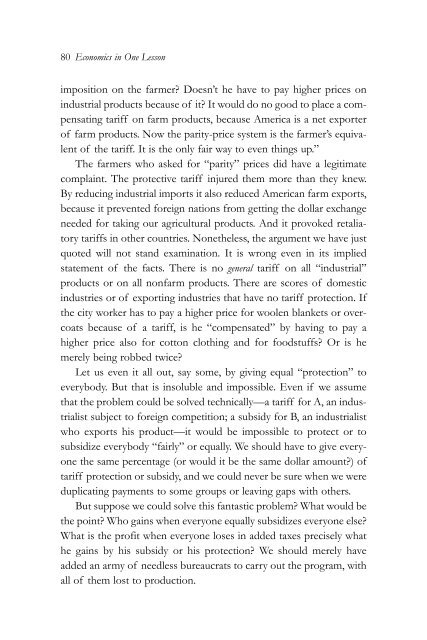1gDdM7w
1gDdM7w
1gDdM7w
- No tags were found...
You also want an ePaper? Increase the reach of your titles
YUMPU automatically turns print PDFs into web optimized ePapers that Google loves.
80 Economics in One Lessonimposition on the farmer? Doesn’t he have to pay higher prices onindustrial products because of it? It would do no good to place a compensatingtariff on farm products, because America is a net exporterof farm products. Now the parity-price system is the farmer’s equivalentof the tariff. It is the only fair way to even things up.”The farmers who asked for “parity” prices did have a legitimatecomplaint. The protective tariff injured them more than they knew.By reducing industrial imports it also reduced American farm exports,because it prevented foreign nations from getting the dollar exchangeneeded for taking our agricultural products. And it provoked retaliatorytariffs in other countries. Nonetheless, the argument we have justquoted will not stand examination. It is wrong even in its impliedstatement of the facts. There is no general tariff on all “industrial”products or on all nonfarm products. There are scores of domesticindustries or of exporting industries that have no tariff protection. Ifthe city worker has to pay a higher price for woolen blankets or overcoatsbecause of a tariff, is he “compensated” by having to pay ahigher price also for cotton clothing and for foodstuffs? Or is hemerely being robbed twice?Let us even it all out, say some, by giving equal “protection” toeverybody. But that is insoluble and impossible. Even if we assumethat the problem could be solved technically—a tariff for A, an industrialistsubject to foreign competition; a subsidy for B, an industrialistwho exports his product—it would be impossible to protect or tosubsidize everybody “fairly” or equally. We should have to give everyonethe same percentage (or would it be the same dollar amount?) oftariff protection or subsidy, and we could never be sure when we wereduplicating payments to some groups or leaving gaps with others.But suppose we could solve this fantastic problem? What would bethe point? Who gains when everyone equally subsidizes everyone else?What is the profit when everyone loses in added taxes precisely whathe gains by his subsidy or his protection? We should merely haveadded an army of needless bureaucrats to carry out the program, withall of them lost to production.


